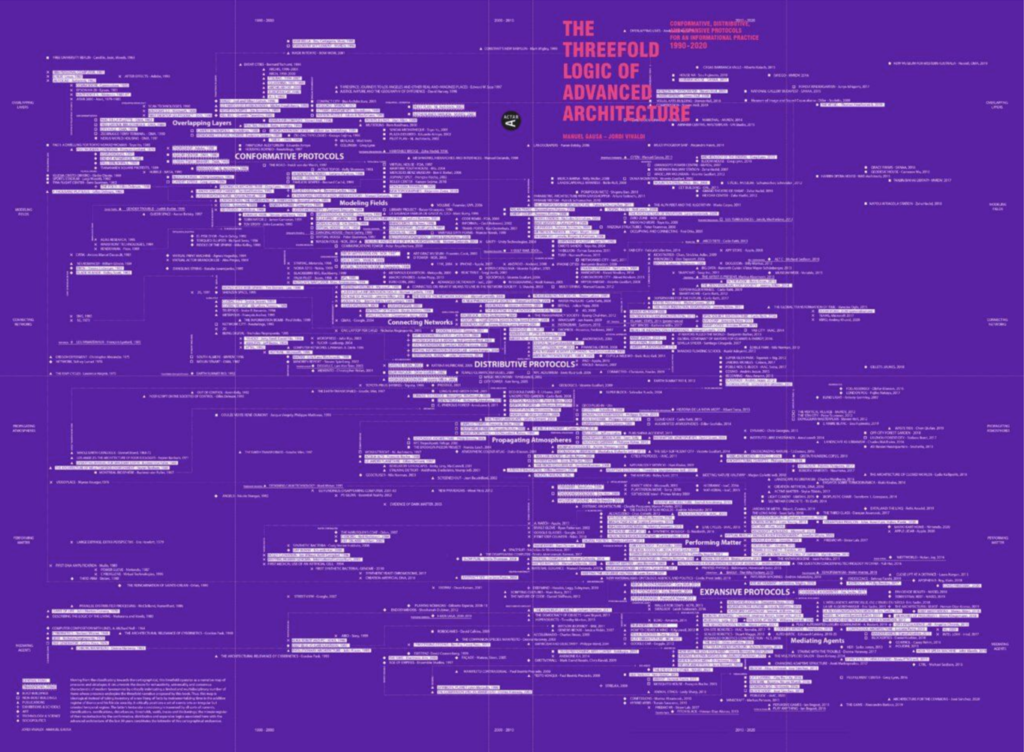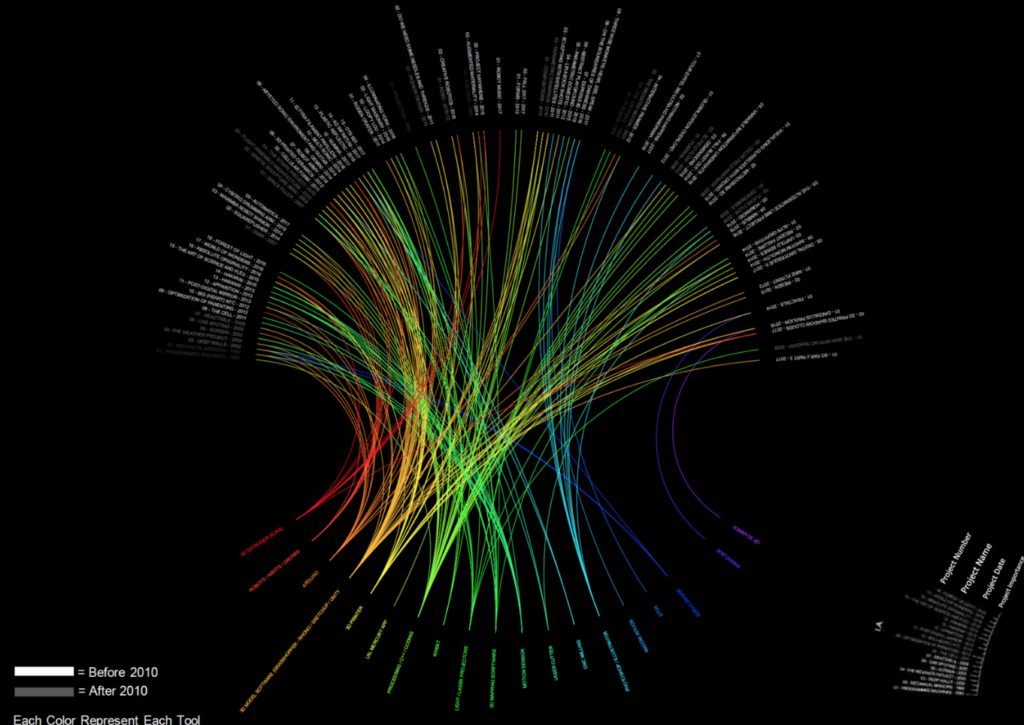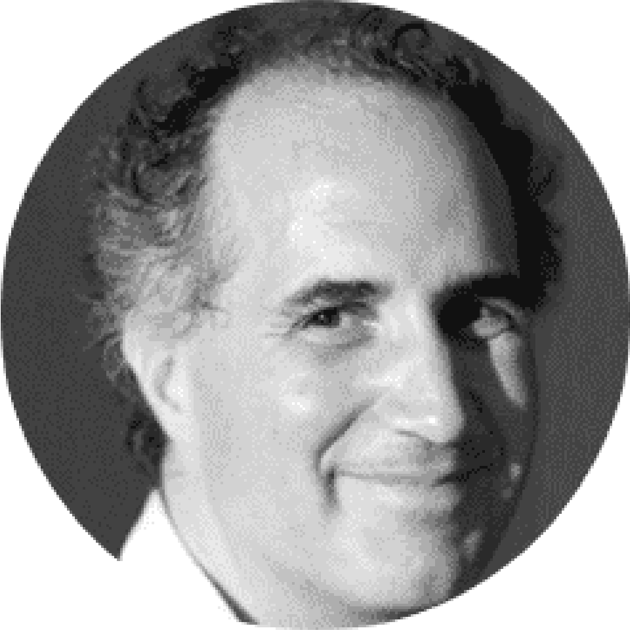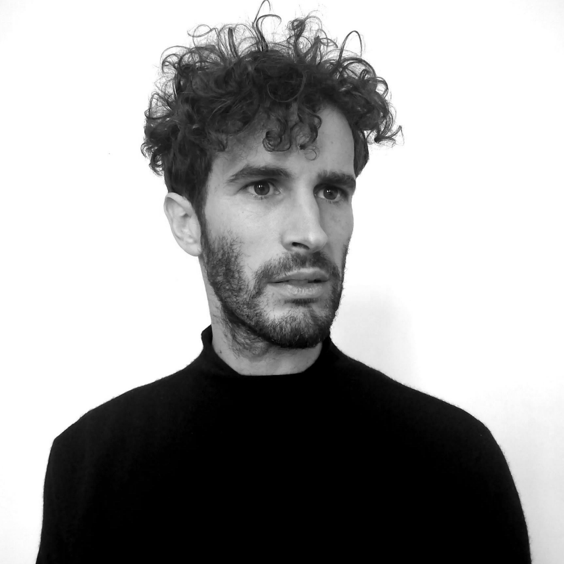EXPANSIVE THEORY
Beyond the Threefold Logic of Advanced Architecture
Seminar Faculty: Manuel Gausa & Jordi Vivaldi
The book The Threefold Logic of Advanced Architecture has confirmed the evidence of a striking change of paradigms in the definition of our spaces of relation, interaction and sociability. These transformations are intimately associated with the embodied and accelerated growth of the technological capacity to process information, increase communication and multiply differential definitions of our environment(s).

Credits: Manuel Gausa, Jordi Vivaldi
Taking this work as a base camp, the seminar will investigate the new theoretical frameworks and challenges that, in the context of advanced architecture, this new decade will face. The term “investigation” comes from the Latin investigare, which derives from vestigium, meaning fingerprint. On the one hand, to investigate is equivalent to “going in pursuit of the fingerprint of something”, that is to say, “to go after the track of something” in order to discover it. On the other hand, to investigate also means to explore an uncertain epistemological domain in order to increase the field of knowledge on a certain matter.
This seminar will have two main parts. The first one will be delivered in the format of lectures, and will consist in the presentation and discussion of the argument of The Threefold of Advanced Architecture. This will be the base from which the second part of the seminar will depart; delivered in the format of desk crits and with the students as main protagonists, this part will consist in the selection of one book of the bibliography in order to understand how its sociological, artistical, technological or economic argument can propel new forms of spatial design for the next decade.
The course is underpinned on The Threefold Logic of Advanced Architecture, (Actar Publishers, 2020), and will be delivered in the format of lectures, workshops and critical discussions. However, the target does not consist in reaffirming its text, but in constructing a critical approach towards Advanced Architecture that on the one side, enters in conversation with one of the selected books, and, on the other side, focuses on how it transcends, expands, increases, interrupts, deviates or insists on the main concepts of the book The Threefold Logics of Advanced Architecture.

Credits: IAAC TAK Course
Faculty

Manuel Gausa PhD (2005 – ETSAB), by the Universitat Politècnica de Catalunya (European Mention). Since 2014, Full Professor of Architecture and Landscape Design, DSA- Faculty of Architecture (UNIGE-Università degli Studi) of Genova.
Since 2014, coordinator of the ADD, Dottorato in Architettura e Design, PhD Architectural and Design Program, UNIGE. Director of the GIC-Lab (Genoa Intelligent Contexts Laboratory), Urban and Territorial Research Laboratory, UNIGE and Co-director of the Group of Research LUAD, LANDSCAPE AND URBAN Advanced Design.
Since 2000 Principal Partner and Co-Director of Gausa+Raveau actarquitectura, the office of architecture, landscape and urban design.
From 2012 to 2015, Dean of the IAAC, Institut d ?Arquitectura Avançada de Catalunya, Barcelona.From 2008 to 2012 Vice-president of the Advisory Council for Sustainable Development (CADS),
Generalitat de Catalunya.
From 2008 to 2014. Professor of Design Projects Studio in the DSA- Faculty of Architecture, UNIGE (Università degli Studi) of Genova. From 2006 to 2008, Director of the Master Program “Intelligent Coast” hosted by Fundació Politècnica de Catalunya.
From 2011 to 2014 Member of the Consell Consultiu de l’Hàbitat Urbà, Ajuntament de Barcelona and Member of the Scientific Technical Committee of CRUIE (Centro di Ricerca per l’Urbanistica, le Infrastrutture e l’Ecologia” – UNIGE).
From 1998 to 2003 he was President of Metropolis and President of the Scientific Committee at the Institute for Advanced Architecture of Catalonia. From 1997 to 2000 Member of Governing Board – Director Cultural – of the ESARQ-UIC, Escuela Técnica Superior de Arquitectura de la Universitat Internacional de Catalunya.
Responsible of FORO, Theory and Critics Area. From 1995 to 2000 Associate Professor of Projects in the ETSAB-UPC, Escola Técnica Superior d’Arquitectura de Barcelona, Universitat Politècnica de Catalunya. From 1991 to 2000 Director of the magazine “Quaderns d’Arquitectura i Urbanisme”.
Founding Member of Actar Architecture and Actar Projects Editorials. Author of various articles and published works, such as “Housing, new alternatives, new systems”, “Metapolis Dictionary of Advanced Architecture”, “HiperCatalunya: Research Territories”, “Operative Optimism” among others. Honoured with the Médaille de l’Académie d’Architecture de France in 2000.

Jordi Vivaldi is a writer, philosopher and architectural theorist based in Vienna.
PhD Architect (IOUD, Austria) and PhD Philosopher cand. (EGS, Switzerland), Jordi is the author of the forthcoming book Limit-Space: Agency and Form in a Xenological World (Actar Publishers, 2021). His areas of research include 20th and 21st century’s theory of experimental architecture, art and technology, as well as various forms of Speculative Realism and New Materialism. His current field of investigation orbits around the notion of “limit” together with associated terms such as “finitude”, “determination” and “reduction”, both in its philosophical and architectural registers.
Jordi’s philosophical work focuses on constructing an ontology of limits within the framework of Speculative Realism, articulating the limit as an ontological territory of differential sameness and auto-referential difference. From an architectural perspective, Jordi’s research focuses on instrumentalizing the limit as a space of notational abundance associated with composite forms of agency.
Jordi is currently working as theory faculty and researcher in several international universities such as IaaC in Barcelona, UCL Bartlett in London, IOUD in Innsbruck and PROPUR in Buenos Aires. Besides his curatorial tasks as editor in chief of the architectural magazine IaaC Bits, his work has crystallized in several articles, essays and lectures. Jordi is also the co-author of the book The Threefold Logic of Advanced Architecture (Barcelona: Actar Publishers, 2020).